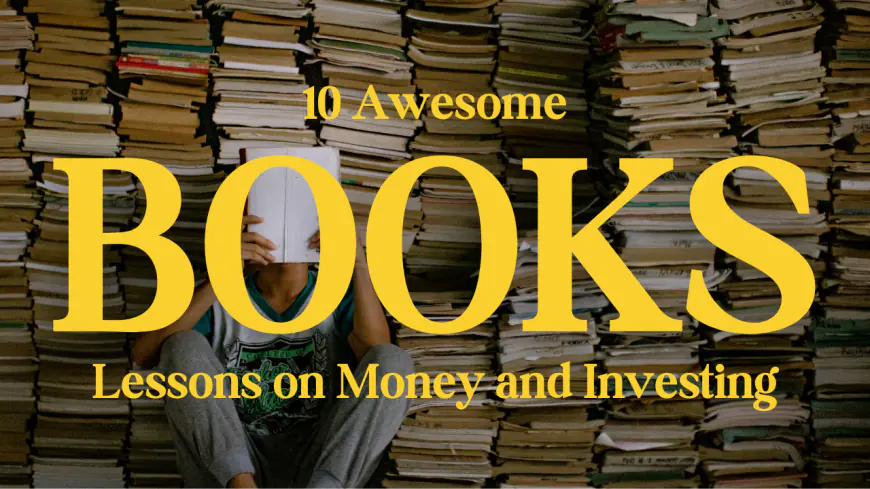Unlock Financial Wisdom: Lessons from Classic Money and Investing Books
Discover valuable insights from iconic books like 'Rich Dad Poor Dad,' 'The 4-Hour Workweek,' and 'The Intelligent Investor.' Learn how to master the fundamentals, diversify income streams, and cultivate the right mindset on your journey to financial success.

Over the years, countless books have been written on the subject of money, investing, and financial wisdom. These books, ranging from classics like "Rich Dad Poor Dad" to timeless titles like "The Intelligent Investor," have served as valuable guides on the journey to financial success. This comprehensive exploration will delve into the key lessons extracted from these influential texts. These books have the power to transform our understanding of money, challenge conventional wisdom, and inspire us to take control of our financial destinies.
Rich Dad Poor Dad: Mastering the Fundamentals
One of the most iconic titles in the world of personal finance is "Rich Dad Poor Dad" by Robert Kiyosaki. The book introduces the critical concept of assets and liabilities, setting the stage for financial literacy. Kiyosaki's two-dad approach, comparing his biological father's traditional financial path with his friend's father's entrepreneurial journey, underscores the importance of independent thinking and investing in income-generating assets.
The Cashflow Quadrant: Diversify Your Income Streams
Building upon the foundation "Rich Dad Poor Dad laid," Kiyosaki's "The Cashflow Quadrant" outlines the four paths to earning money: as an employee, self-employed individual, business owner, or investor. This book challenges the idea that job security is the only way to financial stability, encouraging readers to explore other avenues for wealth creation. It provides a new perspective on how to achieve financial freedom by diversifying income streams.
The 4-Hour Workweek: Achieving More with Less
Tim Ferriss's "The 4-Hour Workweek" may sound too good to be true, but it's all about working smarter, not necessarily less. The book introduces the idea of automating your income, allowing you to live life on your terms. Ferriss explores how to create businesses that can function without constant attention, ultimately enabling you to experience the lifestyle you desire without waiting until retirement.
The Millionaire Fastlane: The Road Less Traveled
"The Millionaire Fastlane" by MJ DeMarco challenges the traditional notions of wealth-building. DeMarco identifies three financial paths:
- The sidewalk (consumers)
- The slow lane (savers and investors)
- The fast lane (entrepreneurs and investors in scalable businesses)
He emphasizes the value of creating systems and assets that generate income independently, ultimately propelling you toward financial success.
Think and Grow Rich: The Power of Mindset
Napoleon Hill's "Think and Grow Rich" explores the power of the mind in achieving success. While some find the book's philosophical approach challenging, it emphasizes the significance of mindset in financial success. A positive, abundance-oriented mindset can lead to actions aligning with wealth-building goals.
The Psychology of Money: The Role of Emotions
Understanding the psychology of money is essential for financial success, as highlighted in Morgan Housel's "The Psychology of Money." Housel discusses how our emotions and biases influence our financial decisions. It encourages readers to focus on financial patterns rather than exceptional success stories to make informed choices.
Investing in Knowledge: Tackling Ignorance Debt
To be successful in investing, it's crucial to tackle what Alex Hosi calls "ignorance debt." This concept acknowledges that the gap between your current knowledge and the knowledge needed to achieve financial goals is what stands in your way. "The Intelligent Investor" by Benjamin Graham and "Girls That Invest" by Sim provide foundational knowledge for aspiring investors.
Conclusion
In the world of personal finance and investing, knowledge is power. The lessons from these classic books serve as valuable tools on the path to financial wisdom. They challenge conventional wisdom, encourage independent thinking, and highlight the importance of mindset in achieving financial success. While each book offers its unique perspective, the common thread is clear: there are no shortcuts to financial success. Discipline, persistence, and a commitment to continuous learning are the keys to unlocking your financial potential. So, whether you're a beginner or a seasoned investor, consider these books essential companions on your financial journey.









